
The legends and myths of the Phoenicians present us with fascinating stories of remarkable people, some of whom are gods and some who may have been real people. It is that tantalizing mixture of mythology and history which makes us wonder which bits might have reflected some reality — albeit with a considerable amount of tall-tale-telling mixed in.
Adonis and Aphrodite, as well as the Egyptians Isis and Osiris, were gods and had superhuman experiences in addition to the drama and pathos which might afflict any human being. Europa and Elissa were women in Tyre who lived among the highest levels of society and their stories might well have been based upon actual people to whom astounding adventures were attributed.
Their legendary stories are told here:
Adonis
This young man was desired by several goddesses, which led to jealousy. In his honor Lebanese people still grow “Adonis gardens.”
Aphrodite
This goddess of love was celebrated by the Greeks as having first arrived in the Aegean at Cythera where the Phoenicians had a colony.
Isis & Osiris
In Egyptian lore, the god Osiris came to the Phoenician city of Byblos, where the goddess Isis came looking for him.
Europa
Greek legends tell us this daughter of the Phoenician king of Tyre was brought by Zeus to Crete, and their son became King Minos.
Elissa
Many years later, Elissa was another princess of Tyre who sailed away with many followers and created Carthage on the coast of North Africa.

Yet perhaps the most intriguing part of these epic stories is that the heroes and heroines all spent time in Lebanon — including the Egyptians Isis and Osiris — and we recognize some of those places. If you have been to Lebanon, it conveys a feeling of “the gods walk among us.” And if you have yet to see those remarkable shores and mountainsides, it gives you a glimpse of what it’s like to be there.
The content of this website is drawn from the research of historian Sanford Holst

Updated October 2, 2023
CLOUD: Phoenician legends and myths, heroes, gods, mythology

Further information
If you would like to experience more of the Phoenician world than you find in these short articles, see the book Phoenicians: Lebanon’s Epic Heritage. This extensive exploration is brightened with 104 illustrations.
Going beyond the few traditionally-cited facts, this authoritative work draws from discussions with leading archaeologists and historians to discover new clues and lines of inquiry into this secretive society.
Phoenicians
You can take a look inside this book. See the first pages here.
